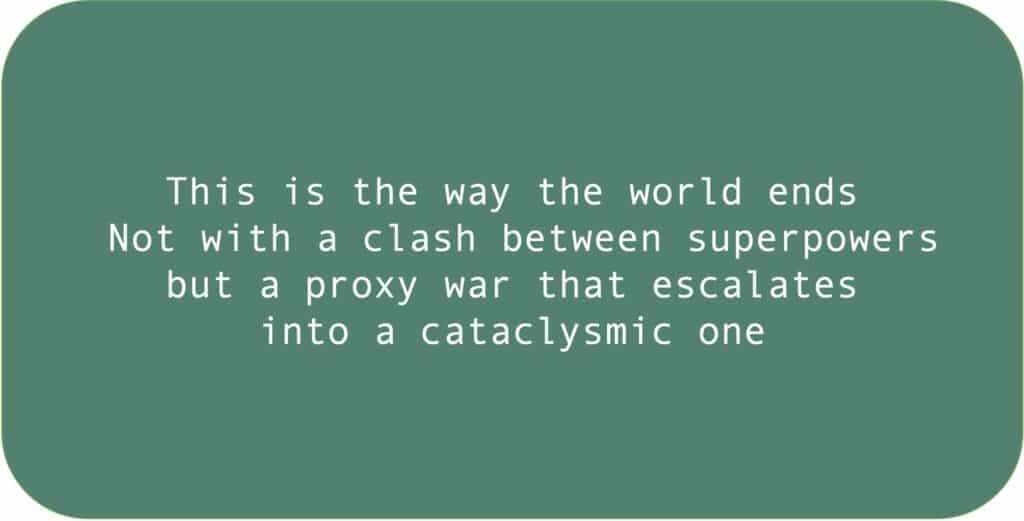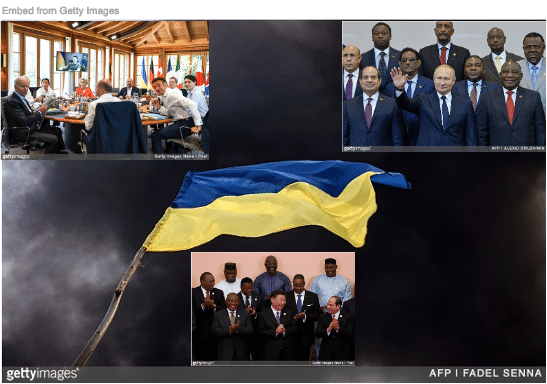
The world is at war in Ukraine – by proxy. Many countries are taking sides. Others are hedging their bets.
Exhibit A is South Africa. It claims it remains non-aligned. Yet it’s conducting war games with Russia and China. That belies its claim.
Ukraine is pitting democracies against autocracies
President Biden has framed this as a war between democracies and autocracies. The United States is leading an alliance of democracies in supporting Ukraine. They are supplying weapons to Ukraine while imposing sanctions against Russia.
Their declared intent is to help Ukraine defeat Russia resoundingly. In other words, they want to make real the late Sen. John McCain’s famous quip. He often dismissed Russia as nothing more than “a gas station masquerading as a country.”
China is leading an axis of autocracies in supporting Russia. Except that their economic dependence on Western countries precludes axis countries from supporting Russia the way allied countries are supporting Ukraine. That’s because they fear allied countries imposing crippling sanctions against them too.
So, most axis countries are limiting their support to “soft” power. They are providing political cover and helping Russia conduct cyber warfare.
Iran is a glaring exception. It is supplying the kamikaze drones Russia is using to devastating effect. But fear of sanctions has even Iran bending over backward to deny supporting Russia.
Of course, Russia made much ado about signing a friendship without limits agreement with China. It must be wondering now why it bothered to do so.
A time for choosing
China is resisting Biden’s framing. No matter how specious, it’s claiming to be neutral. South Africa and other African countries are following suit. Some of these countries are even holding themselves out as the peacemakers. But there’s nothing blessed about them.
No doubt, most feel they have little choice: They’re too dependent on Russia for oil and grain. Or they’re too indebted to China for critical infrastructure.

Mind you, the United States has given these countries hundreds of billions in aid. But those billions were often conditioned on neo-colonial or paternalistic terms. Or they ended up in the personal accounts of “Big Dada” African autocrats. That, in exchange for those autocrats parroting more pro-Western than pro-Soviet rhetoric.
That explains why many African countries are reluctant to side with the US and Ukraine. But it’s also why China has them trapped in a loan-sharking embrace.
Talk about jumping from the frying pan into the fire. China might not be as paternalistic. But it has those countries trapped in such debt that China has become their de-facto feudal lord.
South Africa is conducting war games with Russia and China
That, in a nutshell, explains the position African countries are taking. They want to be like countries that remained neutral during the last world war.
Except that African countries are repeatedly tipping their hand in favor of Russia. And they are doing so in ways the United States must find humbling, if not humiliating. For example:
- The US led the UN in voting on resolutions to censure and sanction Russia. Yet half of the African countries abstained.
- South Africa has rivaled China in propagating Russian propaganda. Its president has framed this as a conflict between two countries with equally legitimate grievances.
- Russia has used Ukrainian grain exports to African countries as a weapon of war. Yet African countries have bought Russia projecting blame on Ukraine hook, line, and sinker; and
- Zelensky has addressed the US Congress and countless other national assemblies. But the African Union denied his request.
The enemy of my former colonial master is my ally
Historical ties bind many African countries to Russia. Even more than debt to China, those ties have them leaning on the side of the axis of autocracies.
Russia is harvesting the seeds it planted decades ago. It provided refuge to many Africans who fled the oppression of European colonialism. And that refuge included education and military training. That’s why many African leaders have greater camaraderie with Putin than Biden.
But this has never precluded them from courting any US president. Indeed, many attended the US-Africa Leaders Summit in Washington, DC, last month. He touted it as a meeting based on shared values to:
better foster new economic engagement; reinforce the U.S.-Africa commitment to democracy and human rights; mitigate the impact of COVID-19 and of future pandemics; work collaboratively to strengthen regional and global health; promote food security; advance peace and security; respond to the climate crisis; and amplify diaspora ties.
(whitehouse.gov)
Not to mention the refuge European countries provide today to Africans fleeing wars, pestilence, and corruption.
Given that, imagine how foolish Biden must have felt when he read this:
War games for Russia’s navy off the coast of South Africa are drawing fresh scrutiny of Pretoria’s refusal to condemn the invasion of Ukraine and insistence that it has not picked sides in the conflict. …
President Ramaphosa’s ruling African National Congress said its snubbing of Western sanctions against Russians and abstentions in UN votes that rebuked Moscow over its aggression in Ukraine and annexation of the country’s land were because it remained neutral.
Yet the naval manoeuvres offer an increasingly isolated Moscow a welcome show of might that South Africa’s budget and reputation can ill afford, Kobus Marais, the defence spokesman for the opposition Democratic Alliance, said.
(The Times (of London), January 16, 2023)
Putin is the master gaslighter. So he must have been proud to see Ramaphosa gaslighting like this. After all, he’s spinning support for Russia as an effort to remain neutral.
But again, South Africa could hardly refuse. I alluded to the reasons why above. But, for further edification, I refer you to my posts on
- China buying political dominion over the Caribbean (Latin America and Africa);
- China calling in (loan-sharking) debts;
- China buying the global influence Russia and the US are fighting for; and
- China using loans to ‘colonize’ the developing world.
Even so, I cannot overstate the simmering resentment that motivates African countries. Again, it stems from centuries of European colonialism and decades of American paternalism.
So I shudder to think what would happen if push comes to shove. Because I suspect most African leaders would choose China and Russia’s brand of autocracy over the US and Ukraine’s brand of democracy.